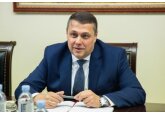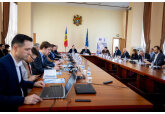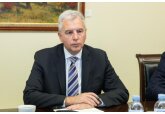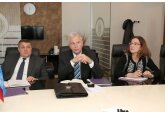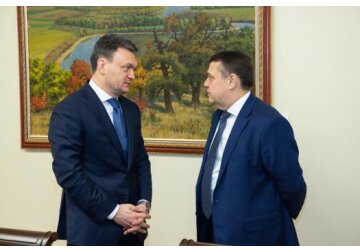
The IMF notes the slowdown in inflation in Moldova, the adequate monetary policy of the NBM and expects moderate economic growth in the country in 2023.
This was stated by the head of the International Monetary Fund mission to Moldova, Ruben Atoyan, at a joint briefing with Prime Minister Dorin Recean, noting that economic growth in our country this year may turn out to be stronger under certain circumstances, but there are also significant risks for the pace of economic recovery. The head of the IMF mission in Moldova stressed that the economy of our country contracted sharply in 2022 due to the consequences of the war in Ukraine, low demand against the backdrop of high inflation, rising living costs and less agricultural production than expected. Ruben Atoyan noted that the IMF predicts a moderate recovery of the Moldovan economy in 2023, which will be supported by the recovery of domestic demand and improved economic growth prospects in the countries of Moldova's trading partners. The Head of the IMF Mission to Moldova stressed that inflation in our country has slowed down because the NBM reacted proactively to limit spillovers and contain inflationary expectations. Fiscal performance remained strong in 2022, reflecting stronger revenue growth and larger grants. The solid foreign exchange reserves of the NBM continue to provide adequate guarantees to weather external shocks, while the banks are well capitalized, highly liquid and profitable and have successfully weathered the initial impact of the war. Ruben Atoyan noted that the Moldovan authorities indicate that although the risks associated with the implementation of the main scenario still remain, there are security risks in the region and the prospects in the energy sector remain uncertain, they will continue to implement policies and plans for an emergency, depending on the evolution of risks. And as the pressures of the energy and cost-of-living crisis subside, the authorities plan to adequately gradually reorient spending to support economic recovery, including by increasing spending on infrastructure. The head of the IMF Mission in Moldova also called the monetary policy pursued in the country adequate. Starting from December 2022, the NBM began to gradually loosen monetary policy, given a faster-than-expected slowdown in inflation, thanks to weak domestic demand and a strict policy package in general. According to IMF experts, further easing of monetary policy depends on a further reduction in inflation in the country. Ruben Atoyan said that in an uncertain external environment, the Moldovan authorities remain committed to ensuring exchange rate flexibility, and NBM interventions will be limited only to the need to mitigate excessive volatility and prevent excessive fluctuations in the foreign currency market. He emphasized that the economic growth prospects in Moldova are at risk of significant downside risks, and the continuation of energy shocks or the emergence of new shocks in the energy sector could lead to new pressure on the balance of payments and the budget. The head of the IMF Mission to Moldova explained that policy-level compromises could become even more difficult in the face of rising inflationary pressures, deteriorating confidence, or the emergence of additional external shocks. In particular, a further escalation of the war in Ukraine may lead to a new wave of refugees, a deterioration in the economic situation, and the security situation. At the same time, according to him, a faster and stronger recovery of domestic demand, as well as the economies of the countries that are the largest trading partners of Moldova, can play a favorable role for the prospects for economic growth in Moldova. “The progress made by Moldova on the path to EU accession can also become an important foothold for the firm implementation of reforms,” said Ruben Atoyan. According to him, the authorities have ambitions to implement a program of agreed reforms in order to obtain resources from the IMF and other external donors. In addition, they are interested in receiving additional funding through a new mechanism that will help focus on solving all issues related to climate change. The head of the IMF Mission to Moldova explained that the fund's experts had already held preliminary discussions on policy priorities, but detailed negotiations will take place in the autumn as part of the fourth review of the implementation of the program financed by the IMF.// 14.03.2023 — InfoMarket


